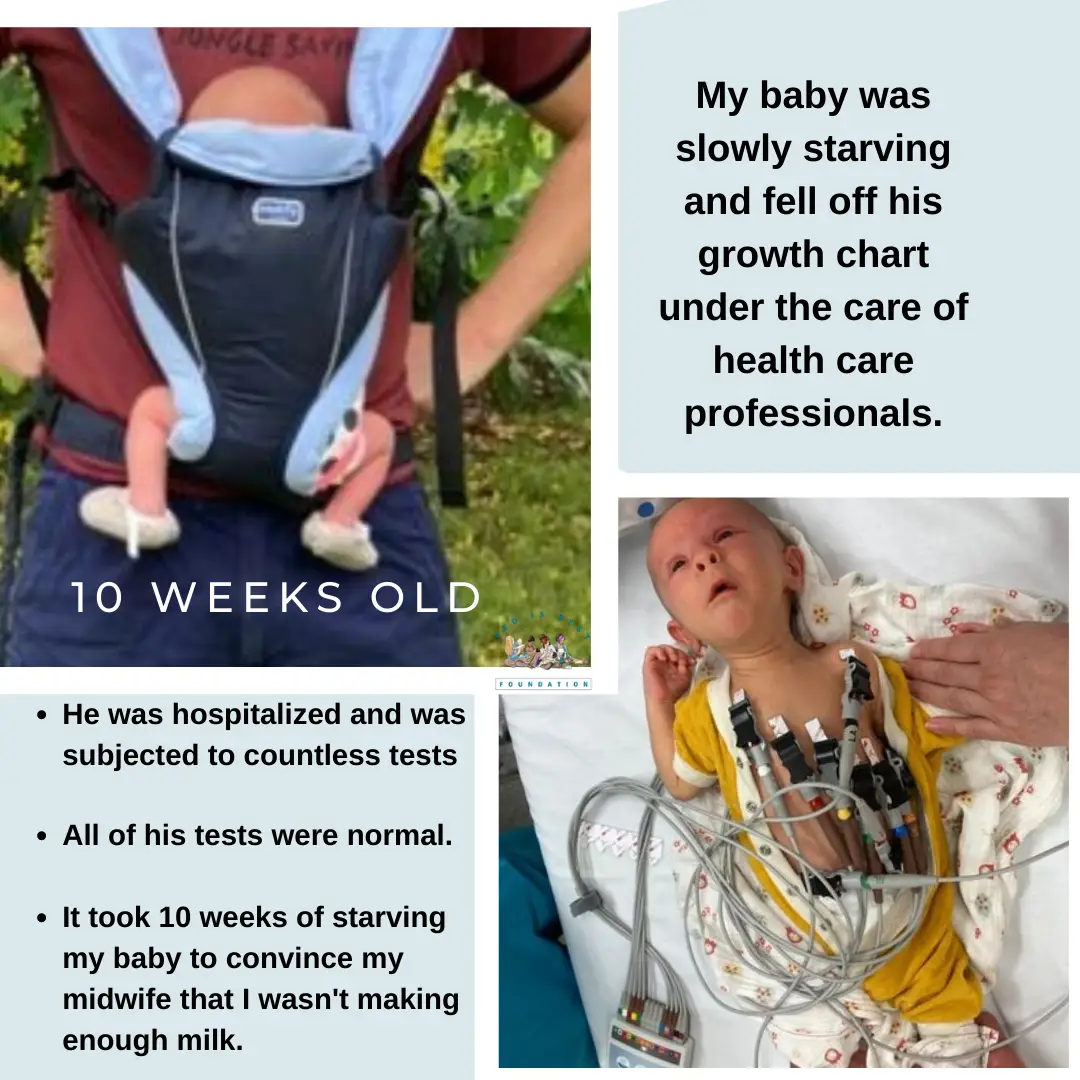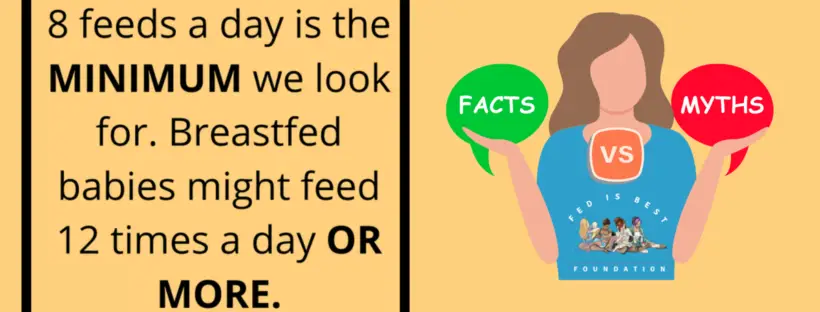A meme posted by an IBCLC states that breastfeeding 12 or MORE times a day is “normal” with no further education on when it can be a sign of newborn hunger, poor feeding, inadequate milk transfer, or failure to thrive.

Overly simplistic memes like this are irresponsible and confusing and, in some cases, are why parents miss red flags that require medical attention and lactation assessment to be sure the baby is receiving adequate nutrition and fluids when nursing. (Source of meme to the left, Facebook, Lucy Ruddle, IBCLC)
Here at the Fed Is Best Foundation, we receive messages frequently from families who tell us they were repeatedly assured by trusted health professionals that nursing 12 or more times a day is completely normal.
But is it always normal?
No, it’s not.
The current research shows that 1 in 5 moms have delayed onset of full milk production, and up to 15 percent of moms have chronic low supply even with optimal lactation management. The most extensive study ever done to measure actual breast milk production was done by Kent et al. in 2016. This study found that between days 11 and 13, 2/3rd of the mothers could not produce more than the minimum 440 mL required to feed their infant exclusively, and between 14 and 28 days, nearly 1/3rd could not produce that minimum. Contrary to popular belief, insufficient milk to exclusively breastfeed is common.
A baby’s feeding interval depends on how much milk they can obtain at one feed. Mothers with abundant supply have babies that commonly feed every 3 hours; those with a lower supply or a lower volume available per feed will have babies who feed more frequently. Some lactating parents who produce lower volumes per feed may be able to meet the total daily requirement of their infant by producing milk faster and feeding more frequently, but that is not always true. Therefore, frequent feeding doesn’t necessarily make up for lower volumes per feed if the daily production does not meet an infant’s nutritional requirement. Approximately 15%, or 1 in 7, will have chronic low milk supply and will experience even more frequent feeding; the lower the supply, the more frequent and the more prolonged the nursing sessions are. These infants risk developing poor or no growth, called failure to thrive, if they are exclusively breastfeeding. Failure to thrive results in a chronically hungry baby who is not growing properly and can impair immune function and brain development. Given how common insufficient breast milk supply is, it’s imperative that we account for the babies who will need supplementation of breastfeeding when educating parents about what feeding behavior is within normal limits.
Because of alarmist breastfeeding education about the ‘risks’ of supplementation, parents commonly fear that any supplementation will harm their babies and their future breastfeeding relationship, which is absolutely false.
Mandy’s baby is one example of when insufficient breastfeeding was not identified. Her son breastfed frequently, often for a full hour throughout the day and night. He developed failure to thrive, gaining only half an ounce in one month when he should have gained 20 to 28 ounces (about 1.5 lb).

Accidentally starving my baby while breastfeeding broke my heart but it made me want to help other moms learn how to prevent it.
You can read her story here and listen to her story below.
The question is, when is breastfeeding your baby 12 or more times a day considered within normal limits after your milk has come in?
We recommend looking for the following eight clinical findings
1. Breastfed babies gain, on average, 0.75 to 1.2 ounces each day until they are four months old. AAP
| Age of baby | Average weight gain per week (in ounces) | Average weight gain per week (in grams) |
| 5 days to 4 months | 5–8 ounces | 150-240 grams |
| 4 to 6 months | 4–6 ounces | 120-180 grams |
| 6 to 12 months | 2–4 ounces | 60-120 grams |
2. Tracking your baby’s weight using the free online newborn weight loss tool (NEWT) shows they are not greater than the 75th percentile of weight loss (below the yellow 75th percentile line on the chart)
3. They will have at least 3-5 yellow, seedy stools every 24 hours for the first 4-6 weeks, indicating that nutrients from milk are being digested.
4. They will have 6-8 very wet diapers every 24 hours, indicating good hydration.
5. They will be satisfied in between nursing sessions and only have a few more frequent, shorter nursing sessions (cluster feeding) for no more than 2-3 hours a day.
6. They remain around the same percentile on their growth curve. Sources: Child Growth Standards (who.int)
7. Your physician confirms adequate growth.
8. Your baby is happy, growing, and thriving.
If your baby is not meeting one or more of these clinical signs, your baby should be fully evaluated for healthy growth and adequate feeding by their physician as well as a lactation consultant or infant feeding specialist.
What happens when we tell parents that breastfeeding 12 times or more a day for all babies is normal?
This baby was diagnosed with failure to thrive because the midwife/lactation consultant told this family that nursing 12 or more times a day is normal without doing any lactation assessment to be sure the baby was transferring enough breastmilk.

This baby was almost always nursing and would fall asleep soon after latching on. She became very weak from lack of breastmilk.

“When talking to her health visitor, I was told her crying was colic. Instead of supplementing her and figuring out why she was weak, she was given ‘colic’ remedies instead.”
This mother wrote, “Each time somebody came to weigh her, whether it be the GP, HV, or Midwife, Mary Kate was not gaining and was, in fact, losing weight. I could not understand because she was ALWAYS feeding. Nobody seemed alarmed by this. I was told to keep trying; she might be a ‘slow starter.’ They never checked to see what my milk supply was or how much she was getting.” You can read her story here.
We could go on and on sharing stories that parents had sent to us about breastfeeding problems and the complications that occurred when signs of poor feeding were ignored and supplementation was not given. They are extremely difficult to read day after day. To read these stories, click here and here.
Fear-mongering
Some breastfeeding advocates prefer to discredit our advocacy for safe breastfeeding and instead accuse us of “fearmongering.” Fearmongering is defined as the act of intentionally trying to make people afraid of something when it’s not necessary or reasonable. (Source: Cambridge Dictionary)
We KNOW our advocacy is reasonable and necessary, as evidenced by all the stories sent to us and the almost MILLION who follow our social media platforms, read our webpage, and have joined our private support groups for parents with nowhere to go for safe infant feeding support. Our advocacy is based on the scientific literature and the clinical expertise of our IBCLCs, physicians, nurses, nurse practitioners, and scientists. Parents from around the globe have reached out to us to share their stories and ask for help safely breastfeeding their children. You can read a Belgian mother’s story here, an Israeli mother’s story here, and a Nigerian mother’s story here about her infant’s death from starvation because their health professionals repeatedly discouraged supplementation.
Some lactation professionals have tried to deflect attention from our warnings about infants being harmed by insufficient breastfeeding. They are focusing on silencing us rather than responding to these tragic stories by changing their attitudes and practices to ensure safe feeding for all babies.
Ensuring that All Parents and Infants are Heard
Our health team educates families daily on identifying signs of insufficient breastfeeding. Yet stories like these are reported to us day after day. These parents’ voices are not being heard, so we must be very loud on their behalf. Our responsibility as health professionals is not to ignore what is happening but to come together and update infant feeding guidelines to protect those babies who fall outside of the norm.
In no other healthcare field would we suggest that patients exhibiting symptoms of potentially harmful conditions (like chest pain) are normal just because most patients are okay. We protect those in danger by encouraging health-seeking behavior when those signs occur…which is why we spoke up when someone declared that nursing 12 times a day is “normal,” with no further explanation of when it is not normal.
We will continue to work to provide complete and accurate education on safe infant feeding for all families, whether feeding with human milk, formula, or both. #FedWillAlwaysBeBest
We LOVE #safebreastfeeding.
Written by Jody Segrave-Daly, RN, IBCLC-Retired, Lynnette Hafken, MA, IBCLC, Christie del Castillo-Hegyi, MD
Additional reading and resources:
Feed Your Baby–When Supplementing Saves Breastfeeding and Lives
A Fully Fed Baby is the Biological Ideal – Fed Is Best
Trouble Breastfeeding? It’s Not Your Fault – Fed Is Best
If I Had Given Him Just One Bottle, He Would Be Alive. – Fed Is Best
Infant Feeding Educational Resources – Fed Is Best
- If you need infant feeding support, we have a private support group– Join us here.
- If you or your baby were harmed from complications of insufficient breastfeeding please send a message to contact@fedisbest.org
